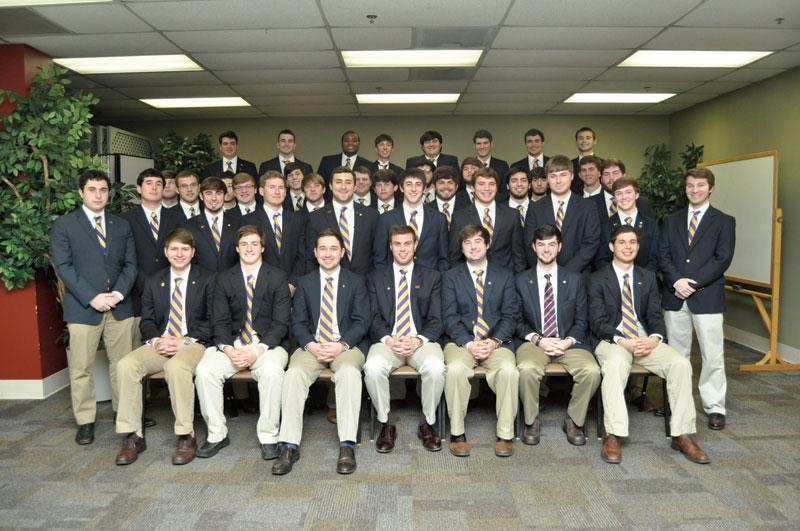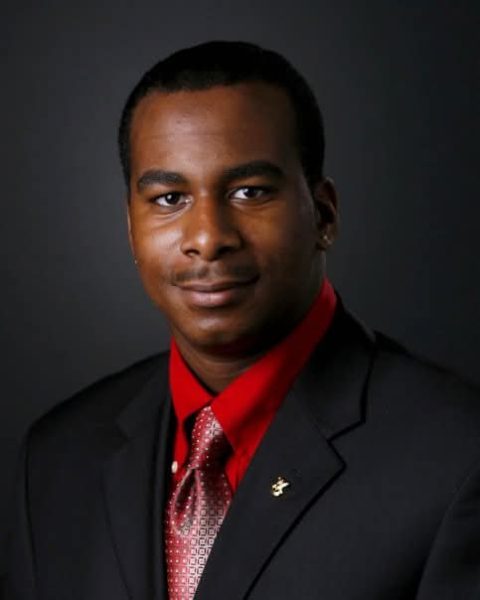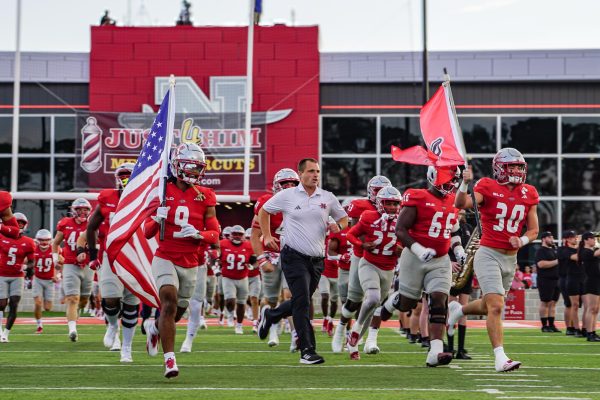Louisiana Chi chapter responds to recent issues within SAE
Photo by: Juliana Pennison
The members of the Louisiana Chi chapter of Sigma Alpha Epsilon pose for a group photo.
In response to the negative attention the Sigma Alpha Epsilon fraternity has been receiving across the country in recent weeks, the Louisiana Chi chapter at Nicholls, rated number one in the country, speaks out on the changes that are being made and how the organization is affected and responding as a whole.
Bloomberg Business labeled SAE as the “deadliest fraternity” in 2013 after conducting a report linking nine deaths to its hazing rituals since 2006. On Mar. 9, 2014, the fraternity’s Supreme Council eliminated the pledge program entirely, shortening the initiation process for new members from several months down to four days. Only a year later, SAE is making headlines again for a racist chant being heard from chapters in Oklahoma, and closer to home at Louisiana Tech University.
Anthony Naquin, Louisiana Chi president, said that last year’s ban on pledging has not really affected the fraternity because in its 10 years since it was established, hazing was never accepted at the Louisiana Chi chapter.
“[The ban on pledging] has presented some challenges only in respect to showing the guys how much the ritual actually means,” said Naquin. “Usually, they had all school semester to learn about [the fraternity] before being initiated, and I found that initiation right off the bat may not make it seem as important as it is.”
According to the Huffington Post’s coverage on the ban, Facebook responses show that some members are not very happy with the change, calling the move “pathetic” and “true stupidity”, claiming that new members will be brothers “without even knowing who our founding father are let alone The True Gentleman.” Naquin said that no members at this chapter are making such claims, and that he actually sees a bright side to this quick initiation.
“Instead of having three and half years,” said Naquin, “they pretty much have four full years to be actively involved in the fraternity now.”
“It really was a needed change,” Naquin added. “In the next couple of years or the next decade, I don’t think any fraternities will have any type of pledging process if I had to guess.”
“Each national fraternity or sorority goes through different changes and phases of policies and procedures,” said Tommy Ponson, Greek Life coordinator. “Whatever is the oldest policy or whatever policy that they feel at that time needs to be tweaked or changed or eliminated, they move toward a mutual agreement and say ‘Okay, this is a better way to do it’ and it just evolves.”
Ponson said this will not change the group, just the education portion of it. In response to the latest allegations of a racist song being sung throughout SAE fraternities, Ponson said meetings with President Murphy, SAE leaders and the governing bodies of all fraternities were held in immediate response.
“We needed to encourage them,” said Ponson, “to let them know it happens in everybody’s family, whether it’s your fraternity, your sorority or your biological family. There are people there who sometimes make bad choices. We needed them to know that they had our full support.”
Both Ponson and Naquin said the Louisiana Chi chapter of SAE have always been an integrated fraternity that has members from many different races and nationalities. Ponson said because of that, members are able to learn about each other, their cultural differences and come together as one.
“I wouldn’t say we’re the most diverse in the country,” said Naquin, “but I feel like we’re pretty diverse in that regard. We did release a statement on our Facebook saying how horrible and disgusting this incident has been. We pretty much distance ourself to show we’re not like that. We don’t stand for that, and we support our national organization’s stance on it by expelling those students from the organization and shutting down the chapter in Oklahoma.”
A Director of Diversity and Inclusion has recently been appointed to the SAE national organization. Mandatory diversity and education programs are being implemented along with a toll-free hotline for members and others to report any offensive or illegal behavior within the fraternity.
“We have a lot of changes that were put into place,” said Naquin, “I think that’s really been needed.”
Some people argue that the deaths and racism in these fraternities are because many leaders are too young and not mature enough to handle the position of power or the level of responsibility it entails. But Naquin believes it has more to do with the culture that was in place when they joined.
“A lot of people come into college and they may not know a lot about fraternities. When they see what’s been going on prior to them, it’s kind of like peer pressure,” said Naquin. “You have these 22-year-old guys doing stuff and you see it at 17 or 18 years old, and you want to fit in so you’re going to follow suit. It’s the same thing that happens here, but the opposite effect, because we have older guys that are setting an example on how to act, which translates to these younger guys doing the same thing and doing the right thing. It’s stuff that just kind of permeates and snowballs over time. I think we’ve been so successful because the older guys have always set the right example and it’s just gone down the line.”







